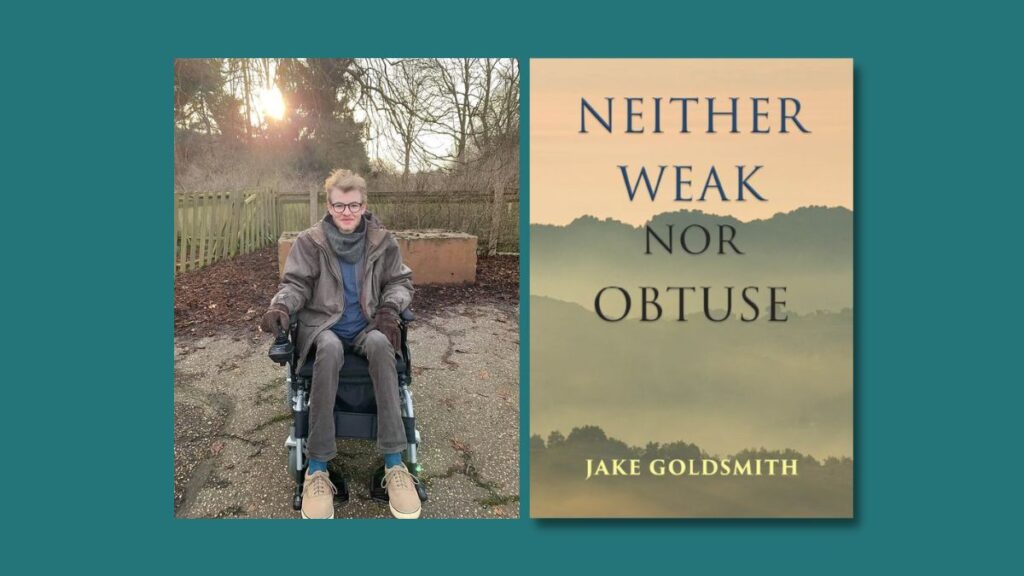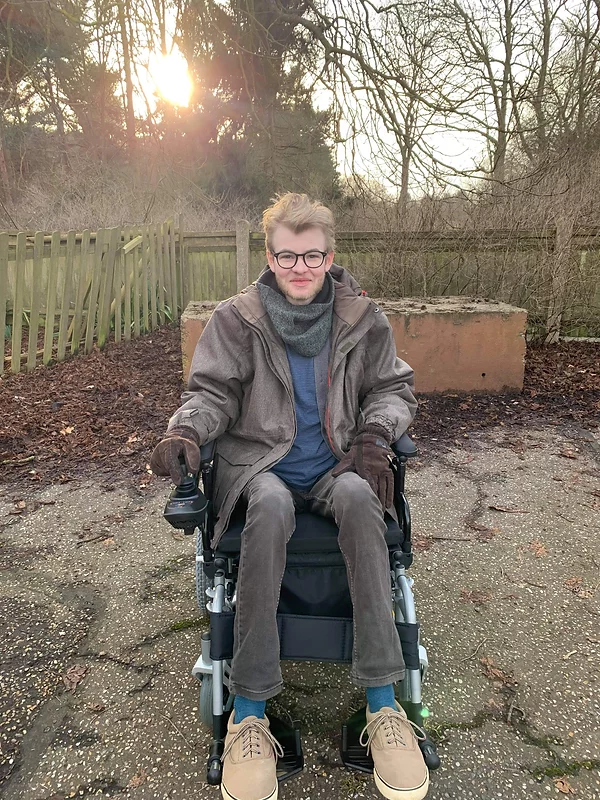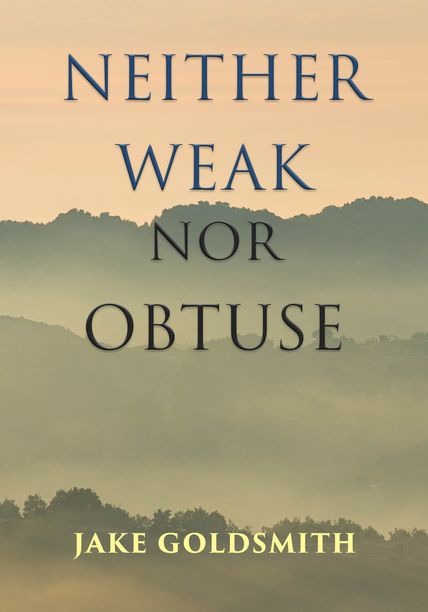
Extract from Neither Weak Nor Obtuse, by Jake Goldsmith (Sagging Meniscus Press)

Jake Goldsmith is a young writer living with the life-limiting condition of cystic fibrosis. He is the founder of the international literary award, The Barbellion Prize, which is dedicated to the furtherance of ill and disabled voices in literature. His memoir Neither Weak Nor Obtuse is published by Sagging Meniscus Press.
Author’s Introduction
I am very ill. That would be the first and most obvious thing to know.
I have something of a haughty and self-important motivation for writing a memoir, being relatively young, as I have the persistent weight of illness stunting my time to speak. I need a model of myself—to have a promotion of my worth—and so here is no small attempt at a testament to my life and constitution. This work is a show of my growth, of what I love, and some diagnosis as to why I would love those particular things.
This model doesn’t have a remedial end, even if one could be discerned, but at least has something—by medical necessity—of an intellectual and physical prognosis.
There’s reason for cautious clarification. I’m having to revisit things and grasp my life as I can, without pedantry, and neither can I exist comfortably in forgetful and easy living—as attractive as that might be.
I revisit things to show some awareness of my past faults, for a lack of care or empathy which pervaded, somewhat, the troubles of my youth as it would with many.
I once witnessed a man who claimed to have read all of Jonathan Swift’s satire, but was still an arrogant and brutish so-and-so who would belittle anyone who did not do well in secondary school or further education.
Arrogance comes easily if one can set themselves apart from their peers just by knowledge accumulation, and I could at least see that somewhere in a younger me. Hubris and immaturity seem more apparent then, even if the lens that sees is blurred by time. I want to have in mind as the rest is written a correction of attitude or tone if not of all I contain. To be read as humble and with a necessary deprecation is my pressing wish.
There are things that can be ordered, reasoned, or finely accounted, but there are those things which are incompatible. As Kierkegaard reminds us, a thinker without paradoxes is a lover without feelings. I will try to show what I feel, with all those addled contradictions, for what is perhaps a final time.
I could follow the path of abandonment found in Rimbaud[1], which attracts me on the harder days, or I could find my steadfastness in different ways when it comes to what I will be describing.
To befit my well-being in this shortened life of mine, I am better disposed to engage in personal readings of philosophy and literature than to be caught in the meticulousness of study. I was disgusted, worn-out, made weary and drained by university life and formal education. I failed to see why I was putting so much time and energy into the studious road when I was such an unpleasant student: talking beyond what I needed to, not staying in-line with a syllabus and at least half-appearing an arrogant young man who thought himself above his station.
Only the factual constraints of my health, my lack of wealth, parental wishes[2], and not being able to be some free-wheeling layabout kept me from packing up my things and leaving more expediently. But eventually the relevant people knew of my dilemma and helped me to escape.
I can only express gratitude and love for all their understanding and affection.
I may never reach the stage when I know what I want to do with my future—if it exists. But I do want to write, and that is all—for myself and anyone who’ll read. I have no need for a long and aggravating study of canonical figures to then improve my perception or outlook on literature and life.
To live like that, with deadlines and a need to be tidy, did very little to suit my bodily circumstances. Being freed of the need to conform to a system I struggle to appreciate leads to a more pleasant experience, and a lot less trouble.
I had plans to move to Bergen in Norway to study. But with my time as it is, it would surely be better to just visit the place casually. The problems with either of these callings (a life of action or not) are different, and I feel I can more easily, and with a healthier heart, better manage idleness and my own bounded freedom than always being busy: physical business being something I have never appreciated.
For a person whose only real aim is to write—if not, to do nothing—college or university would become unhelpful beyond (what the Americans would refer to as) the sophomore year. By that time one would know that further wisdom, not the compilation of information, comes from a personal and indulgent reading of, say, Goethe, or Montaigne, and not the dry dissection, or vivisection, of impersonal work in a lab-setting—and from getting out in the world and living.
Most of the rest of scholarship in academic philosophy, history, even literature, amounts to something paltry. Not so much dead, but lifeless authors in unread journals. It has the misfortune (a great one considering how worthy the subject can be) of being for prim, pallid and uninspiring young men who will end up either teaching or devoting maybe 30 years of their sterile lives to investigating some miserably obscure facet of life, unless they take the initiative to do something more inspired and less set in drudgery.
That said, I will not besmirch the better name of teachers or professors. There are those of a different variety and process to whom I owe the deepest of gratitude. But to be taught in the scholastic setting is something I’m averse to. The educational life is otherwise used as a stepping-stone by the proto-student to secure some sort of work. Sure, scholarship is necessary; but it is not for me.
So I write, without care for scholarly enterprise, and I try to relax for the remaining years in my rarer setting of neither needing nor being able to do things. In the final analysis, I felt I had to leave formal study. My health had suffered and I could not have continued. But I can at least say I did enjoy some of the company.
Of what my writing would be, then: fundamentally it is a difficult demonstration of my personal journey, faced with many interior and exterior problems. It cannot overcome or outpace these challenges, but explores how I might contend with them given what is possible.
The first few sections deal with my views on philosophy, thinking, and discourse. They are a little divorced from the phenomenology of illness, though nonetheless linked, while the latter sections deal more directly with living with illness. It is a portrait of my life, so if you want to skip the more academic considerations you may go to the penultimate section.
I was given a touching description by a distant American friend: ‘Dostoyevsky’s Underground Man tempered by the measured humanity of Camus’ Dr Bernard Rieux[3].’ I hope I can maintain this measure until my last words, as it would be an appreciable legacy.
[1] Arthur Rimbaud (1854–1891), French poet, a known libertine and restless soul who travelled extensively after ending his literary career at the age of 21.
[2] Before I went to university my parents had high hopes for the prospect of me being less educationally regimented and more able to expand my learning horizons, as I seemed to be limited within secondary education. Unfortunately university was not for me, considering my health as well as the narrow nature of my university course, and while my parents were at first enthusiastic for me to continue my studies, I was unable to. Eventually we all understood and I left university.
[3] Dr. Bernard Rieux is the narrator and main character of Albert Camus’ La Peste (The Plague). A practical man, Rieux struggles ceaselessly against the plague in the city of Oran despite his fatigue, his unbelief, and signs that his efforts are having little effect.












